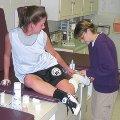This is the VOA Special English Education Report.
One job of an athletic trainer is to treat injured athletes. But does it make a difference if the trainer is male or female?
Sometimes, yes , if an injury or condition is a "male problem" or a "female problem." Then athletes say they are more likely to want treatment by someone of their own sex.
But what about a problem that could affect either sex, like a dislocated shoulder? Researchers at North Carolina State University asked male football players at two American colleges.
The study found that those players would still probably choose a male trainer -- unless the injury made them feel depressed. Then they would most likely choose a female trainer.
The researchers offer two possible explanations. They say football players might be seen as "weak" if they talk about their depression with a male trainer. Also, over half the players described female trainers with words like "caring," "nurturing" and "affectionate." The researchers say this shows that "gender stereotypes" have influenced the opinions of the players about women. They say the concern is that players might see the training room as not the place even for well-qualified women.
The study, led by Heidi Grappendorf, is in the Journal of Athletic Training.
Trainers are an important part of an athlete's life. But an organization based in California is working with coaches to help influence boys to show more respect toward girls and women.
Feroz Moideen is director of the Coaching Boys into Men program of the Family Violence Prevention Fund. He says the nonprofit organization works with police, judges, teachers and coaches. He says the group used a million-and-a-half-dollar donation from the Nike Foundation to expand the program to cricket players in India.
FEROZ MOIDEEN: "We tried to use the power of cricket coaches in that instance to reach young boys and, once again, to educate them about healthy relationships and to model healthy and respectful behavior toward women and girls." Written materials are also being provided to other countries through UNICEF, the United Nations children's and educational agency. Brian O'Connor of the Family Violence Prevention Fund says young men need guidelines in how to treat young women -- in person or online. BRIAN O'CONNOR: "Talking about unwanted or excessive text messaging, or breaking into someone's Facebook account. We're calling this digital dating abuse, another form of abuse that has been really heightened now through technology." And that's the VOA Special English Education Report. You can find our reports online at voaspecialenglish.com and on Facebook and Twitter at VOA Learning English. I'm Jim Tedder. ___ Includes reporting by Mike O'Sullivan

